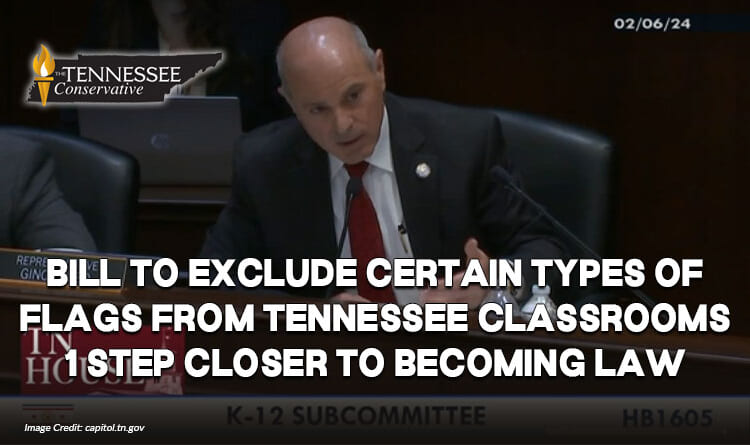Image Credit: capitol.tn.gov
The Tennessee Conservative [By Kelly M. Jackson] –
This week in the House K-12 Education Subcommittee, a bill that if passed into law, would allow for only specific types of flags to be displayed in classrooms across the state, navigated through its first hurdle, now moving onto the full House Education Administration Committee.
HB1605 is being carried in the Tennessee State House by Representative Gino Bulso (R-D61-Bentwood) and in the State Senate (SB1722) by Senator Joey Hensley (R-D28-Hohenwald).
Caption text of the bill reads “Flags – As introduced, prohibits LEAs and public charter schools from displaying in public schools’ flags other than the official United States flag and the official Tennessee state flag. – Amends TCA Section 5-5-114; Section 6-54-144 and Title 49.
Due to previous discussions regarding the type and manner in which the flags can be chosen and displayed, an amendment was added to the original bill to address those concerns.
Representative Bulso presented the amendment and enumerated the specific issues and how the amendment addresses each one.
The first issue addressed had to do with other flags from other countries and whether those would be permissible. Based on comments from Bulso, the concern seemed to be with flags from Eastern European countries, namely Ukraine.
Bulso explained that the amendment makes room for any flag that is “A flag that represents a country or political subdivision”, which would logically include flags from other countries.
In order to address the issue of a type of flag which might need to be used temporarily as part of a lesson plan, Bulso explained the amendment addresses this issue, and states that these types of flags can be “displayed temporarily as part of a bona fide course curriculum”.
Other aspects of the amendment that were elaborated on was the definition of the word “display”, which for the purposes of the bill mean “to exhibit, wear or place anywhere students may see the object”.
Bulso explained that inclusion of the definition was necessary to address any efforts by those who would try to creatively sidestep the law and attempt to expose their students to prohibited materials through the use of a piece of clothing, jewelry or some other kind of art.
Other types of flags that are also allowed under the bill include:
• The United States Flag.
• The Official Tennessee state flag.
• The POW/MIA Flag.
• A flag that represents an Indian Tribe, Metropolitan Government, or other political subdivision.
• A Flag that represents a unit, branch or other division of the armed forces.
• A flag that represents a college or university.
• An official school flag.
• A flag that represents an organization that uses the school property and only displays the flag while the property is in use.
To address any constitutional concerns, also included in the amendment is a “severability clause” which states that if certain parts of the bill are ever held by a court of law to have violated the Tennessee Constitution or the United States Constitution, that the other parts of the law which are not affected, can be “severed” from the rest, and remain as law in the state.
Bulso then reminded those in attendance, of the current Supreme Court precedent that governs these types of issues, which is Garcetti vs Ceballos, a case from 2006 that held that speech by a public official or employee is only protected if it is engaged in as a private citizen, and not in their official capacity as a public employee.
In other words, when teachers are teaching in the classroom, the interest of their students and the goals for learning outweigh the educators right to espouse their personal political ideologies in the classroom to their students.
Finally, the bill also provides that any parent or guardian of a student that observes the law not being enforced, has the right to file a civil action in a chancery court, upon their first providing the school written notice of their intent to file, giving the school a 10-day window to remedy the violation.
There is no mention in the bill or the amendment of what consequence would occur should a violation be litigated successfully.
There were several spectators in the hearing who opposed the bill, and shouted at members in the hearing room when the bill passed, with only one member of the committee, Sam McKenzie (D-D15-Knoxville) voting no.
As previously stated, the bill will move onto full committee for review, and then if it passes there, it will move onto the house floor for a full vote.
We will continue following the bill as it progresses through the legislative process and report on any new developments.

About the Author: Kelly Jackson is a recent escapee from corporate America, and a California refugee to Tennessee. Christ follower, Wife and Mom of three amazing teenagers. She has a BA in Comm from Point Loma Nazarene University, and has a background in law enforcement and human resources. Since the summer of 2020, she has spent any and all free time in the trenches with local grassroots orgs, including Mom’s for Liberty Williamson County and Tennessee Stands as a core member. Outspoken advocate for parents rights, medical freedom, and individual liberty. Kelly can be reached at kelly@tennesseeconservativenews.com.













